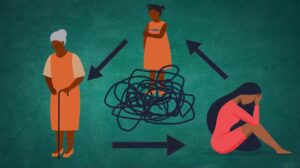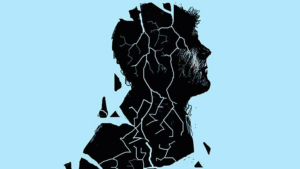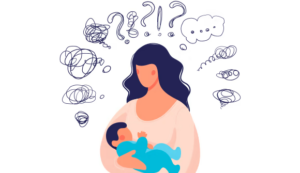Joseph is twenty years old and is transitioning into secondary school. He started going through anxiety which was in different forms. He would get panic attacks.
The anxiety kind of controlled his life and hindered his daily activities. He isolated himself from people of his own age and was afraid to talk.
He would prefer talking to his teachers rather than the students.
When he was twelve years old, he was bullied for being gay. He would get into manic episodes and lose touch with reality.
In the beginning, it was harmless but then it kind of turned into everyone coming to hunt him down.
He started running from everyone including his family. He was admitted to a Mental Health Service out there, he was diagnosed with bipolar disorder. He underwent Cognitive Behavioural Therapy for Bipolar disorder.
Bipolar Disorder is a disorder in which the mood is defined by periods of intense increased emotion called mood episodes.
Joseph had to fight with symptoms of suicidal thoughts. He was feeling very dark for a long time having negative thoughts in his mind and wanting to die. He felt his life was not worth living at all.
Different types of medications and Cognitive Behavioural Therapy for Bipolar disorder were given to him which calmed down his episodes.
So, let us first know about bipolar disorder?
Bipolar disorder is the most extreme form of the disorder with some manic episodes lasting for seven days.
Bipolar 2 disorder consists of hypomanic and depressive episodes.
Mentioned below are five signs of a bipolar disorder:
- Mood Swings-Mood swings from intense highs to extreme lows are one of the biggest signs of bipolar disorder. While you may experience swings from hormones or other factors, those with bipolar two disorder often experience alternating periods of hypomania, depression, and regular function. It may be a sign of bipolar disorder when your mood swings are frequent and it interferes with your sleep and daily activities.
- Cycles of depression-Symptoms of depressive episodes may include strong feelings of guilt, worthlessness, disinterest in previously enjoyed activities, and even thoughts of suicide. Seeking treatment for a depressive episode may lead to a misdiagnosis of the major depressive disorder instead, but it is likely to be bipolar if symptoms of depression occur for a few weeks.
- Risky Behaviour-During manic episodes, people with bipolar disorder are more likely to engage in risky behaviors. Impulsiveness with money like risky investments in gambling and actions that endanger yourself is an examples of real-life risky decisions made by people with bipolar disorder.
- Periods of Intense multitasking or Energy-With bipolar 2 disorder, you typically experience less intense manic episodes or hypomania. So, you may not see how your increased multitasking and energy during a hypomanic episode differs from a normal productivity boost. But, those around you will probably be able to see this change in behavior.
- Talking faster than normal- When going through a manic episode, you may experience irregular speech patterns like trailing off in the middle of a conversation or talking more than you normally do. You may be unaware that you are talking faster than normal, but someone close to you will probably pick up on it.
CBT for Bipolar Disorder-If human emotion was a thread, the opening and loose end would be happiness and the confusing, twisted and heavy end would be sadness. Most of us would experience a little bit of everything-a little sad, a little happy, somewhere in the middle, but someone with bipolar would experience it all, way too much, way too frequently, and way too fast. They feel way too intense.
When someone with bipolar is happy, they are so happy, they feel like an inflated balloon always flying high. Even at 3 am, they may not be sleeping because they are just so high on happiness. During bipolar, their energy, interest, and self-esteem in life go up. Every good thing goes up but it goes up so much that it does not feel good anymore. They start shopping, drinking, and partying a lot because they have so much energy, they do not know what to do with it.
In bipolar, you are so happy that it is called mania and then hits the low. For some people, depression is a disease but in bipolar, depression is a symptom and also forms a major part.
In depression, their energy goes low, and their self-esteem and interest in life go low. Depression is the opposite of mania therefore it is often called manic depression.
Bipolar is a very tricky thing because some people have more mania than depression, some people have more depression than mania and some have both at the same time and some do not have any of these but still, they are bipolar.
CBT for Bipolar Disorder is an effective way to treat this particular mental illness.
Treatment for bipolar disorder:
The first line of treatment for bipolar disorder is medication. Working with your psychiatrist or online therapy/counseling for bipolar disorder; patients can come up with a very effective regimen for the management of their emotional states.
In recent years we have looked at what the addition of Cognitive Behavioural Therapy for Bipolar Disorder does in the treatment. It helps in accomplishing a number of things. People who have taken CBT treatment, medications and some family therapy have over the years fewer episodes of bipolar disorder or mood swings. Those episodes are shorter and they are often of less intensity.
Online Psychologist for Bipolar Disorder Treatment shows three essential characteristics.
- Helping patients to identify early warning signs that they may begin to experience. One of the first aspects that are very helpful from a CBT perspective is an exercise that they do with patients helping them to identify the early warning signs of cycling. Patients are asked to identify for them what would be the early signs they feel while depressed or what would be the early signs of becoming manic. As a function of identifying those signs, patients are then taught things by an online psychologist for bipolar disorder treatment that they can add in or take out that could influence the severity, intensity, and occurrence of that cycle.
- Education of patients about the nature of circadian rhythms and how those affect mood cycling. Patients who suffer from bipolar disorder are more sensitive to disruptions in their circadian rhythms than patients who do not have bipolar disorder. So, helping patients to design and then trying to adhere to the most regular daily schedule with regard to sleeping, eating, etc. It is often very helpful in helping patients to control or regulate their moods.
- Addition of a family therapy component. Research has shown that when you educate the significant others in patients’ lives that they can be helpful to patients in identifying moods or early warning signs and also help them to be careful to maintain their circadian rhythms.
To conclude, the treatment success rate with the help of Cognitive Behavioural Therapy for Bipolar Disorder is a remarkable 80 percent. Making a few lifestyle changes such as limiting stress, eating healthy, and getting enough sleep and exercise can help someone manage this illness. Bipolar patients with full remission receive more social support than those who do not achieve full remission. Poor social support may increase the risk of relapse in the illness.
Bipolar disorder can detrimentally affect people’s life. In addition to making the appropriate treatment choices and staying active, bipolar disorder can be easily managed.
Feel free to reach out to us for counseling and psychotherapy sessions from our trained psychologists, and psychotherapists.




